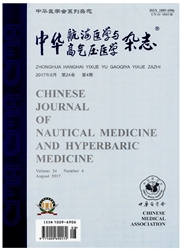

 中文摘要:
中文摘要:
目的 研究内皮细胞特异性分子-1(ESM-1)作为敏感的分子标志物对乳腺癌预后的预测及复发的判断。方法选取133例乳腺癌患者石蜡标本,进行癌组织和癌旁组织切片,采用免疫组化法研究ESM-1蛋白的表达,分析ESM-1与肿瘤生物学行为及患者预后之间的关系。结果 ESM-1的表达在乳腺癌组织中弱,而在癌旁组织中强;在分期早的肿瘤中表达高于分期晚的肿瘤。ESM-1和乳腺癌的预后有着密切的关系,在腋窝转移阳性患者中ESM-1表达低于腋窝阴性患者且差异有统计学意义(P〈0.05),人类表皮生长因子受体2(HER-2)过表达患者中ESM-1的表达低于HER-2无扩增患者,差异有统计学意义(P〈0.05),其他相关因素差异无统计学意义。结论 ESM-1可以成为判断乳腺癌患者预后的一个分子标志物,ESM-1在组织中的高表达往往预示着该患者有较好的预后和长期的生存。
 英文摘要:
英文摘要:
Objective To investigate the endothelial cells specificity molecular-1 ( ESM-1 ) as a sensitive molecular markers to predict the prognosis and recurrence of breast cancer. Methods 133 cases of patients with breast cancer was selected. The expression of ESM-1 in breast cancer tissues and normal breast tissue were detected to analyze the correlation between endocan and the biological behaviors and prognosis of breast cancer. Results The results demonstrated that ESM-1 level was down-regulated in breast cancer tissue compared to normal breast tissue. Corre- lation analysis demonstrated that there were significant positive correlations between ESM-1 expression and survival rate, and HER-2 expression level and lymph node metastasis, the difference was statistically significant (P 〈 0.05). Conclusion ESM-1 could act as a bio-marker in the diagnosis and prognosis judgment in breast cancer patients. ESM-1 high expression might be a predictor for prognosis.
 同期刊论文项目
同期刊论文项目
 同项目期刊论文
同项目期刊论文
 期刊信息
期刊信息
